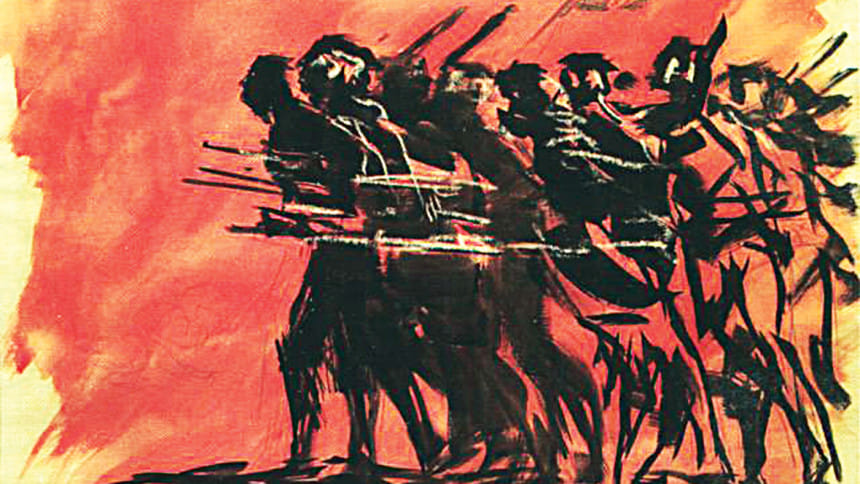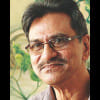1971: Some fragments of memory

For a couple of months after the 1970 elections everything seemed simple and straightforward. For the first time in fifteen years a Bengali was going to head the government of Pakistan. Coincidentally, the USIS had organized an all-Pakistan English-language poetry contest whose award ceremony would take place in early January in Lahore. My Dhaka University classmate Feroz Ahmed-ud-din and I were among the three prize winners, and earned an all-expenses-paid trip to the city. Everyone we met seemed to have accepted the election results; some wanted to know when "Sheikh Sahab" might visit Lahore and address a public meeting. Little did I suspect that in two months we'd look upon Lahore as a foreign city – in an enemy country.
Academic life was on hold as negotiations for the longed for transition went on. I would gather with my closest friends for virtually endless addas. As the political temperature shot up after the postponement of the parliament session, the big question on our minds was: will Yahya peacefully hand over power or would there be an armed struggle? Sporadic violence had already become a common occurrence, and Leftist parties as well as young radicals within the Awami League had already declared that we shouldn't settle for anything short of total independence.
Talks continued while more and more soldiers were flown in to build up the government's military muscle. To use the fashionable Marxist idiom of the time, would the rising Bengali bourgeoisie and the entrenched old bourgeoisie of West Pakistan come to an understanding before the powder keg on which they were poised exploded?
On the night of the explosion we finished our adda with a round of flush. We weren't card enthusiasts, but a little game with five-paisa stakes seemed a good way to relieve the tension that had been building up. I won enough to buy a pack of ten Wills Filter Tipped. It was late when we dispersed, only to be surprised by a dramatic turn of events. The streets were full of excited people.
"Yahya has fled", they said; "the army will attack."
Everyone was busy putting up barricades with whatever lay at hand. We were reminded of what we had read of the French Revolution, the 1848 Springtime of the Peoples, the 1871 Paris Commune.
I had barely reached home and gulped down the cold supper left for me on the table when the shooting started. Within minutes it spread to various parts of the city, a low-rise sprawl with barely a million and a half inhabitants. From my second-floor rooftop room in Naya Paltan one could make out the key hotspots: Rajarbagh Police Lines, Peelkhana EPR Headquarters, the Dhaka University campus. Tracers flew like flaming birds and rang against the newly built water tank in Fakirapool, flares lit up the sky, screams came from the distance; and all night the rattle of incessant automatic fire blended into a banshee shriek.
Those born into a high-tech world of instant satellite communication, Whatsapp and smartphone videography will have to use their imagination to understand that while the mayhem went on all night and into the following day, the rest of the world knew nothing. There was nothing immediately on the radio, not to mention television.
Eventually the radio station in Dhaka announced that we were under a shoot-at-sight curfew. This was lifted for a few hours on 27 March, giving us an opportunity to glimpse the horrific signs of carnage on the Dhaka University campus. The streets carried a stream of humanity escaping the city of death on foot. Their leader, whom they referred to with a mixture of reverence and affection as Bangabandhu, had been arrested, but in the evening the declaration of independence in his name by Major Ziaur Rahman reached many ears, kindling hope.
I spent some time over the next two days with a few friends who would lose their lives in the war: Rumi, Chinkoo (Alauddin Zaheen) and Ahmed Bhai. Ahmed Bhai, a Chittagonian, was eager to head for his hometown to join the resistance, as was Chinkoo. I said I would go with them, but first I had to go to my mother's ancestral village where most of my family had already gone, and see if they were all right.
The village, though only a mile from the road to Narsingdi, was tucked away amidst leafy trees, farmland and ponds. The crackdown had resulted in our biggest family reunion ever. Along with my numerous cousins I tried to follow the course of the war by monitoring radio broadcasts from the BBC, Akashbani and, most inspiringly, Swadhin Bangla Betar Kendra. It became clear that it would be a long war. The resistance in Chattogram crumbled within days, and in the first week of April the enemy attacked Narsingdi, where rebel forces had gathered.
Meanwhile, Chinkoo and Ahmed Bhai had impetuously set off for Chattogram, only to disappear under mysterious circumstances. From hearsay rather than any reliable information it was later surmised that they had been mistaken for non-Bengalis and murdered. They were both light complexioned, and though Ahmed Bhai spoke impeccable Chittagonian, Chinkoo had scant acquaintance with rural Bengali culture, and it is not unlikely that he failed some kind of ethnicity test. All this came to light after the war, and like all other losses (Rumi and some other members of his urban guerilla squad were picked up and never heard of again) added a melancholy undertone to the euphoria of victory.
The swearing-in of a Bangladesh government at Mujibnagar marked an important step forward, politically speaking.
Militarily, too, signs of an organized struggle became evident. Training centres were set up across the border, and areas of operation demarcated into sectors and sub-sectors. Volunteers began trickling across to join the Mukti Bahini, as the liberation army came to be known. Other volunteers facilitated their journey, guiding them part of the way.
In mid-May five of us, three cousins and two young uncles, decided that we would soon make a move. To allay the suspicions of elder members of our families we let it be known that we would visit a distant relative who had invited us. The plan was that we would spend a couple of days there and then move on to visit another distant relative. There, we would meet a Chhatra League volunteer who would accompany us to a village on the banks of the Meghna. The rest of the way we'd be on our own.
The first lap of the journey involved a trek of ten kilometres or so. Halfway through we ran into heavy rain and arrived thoroughly drenched. Our host, a distant cousin with a sharp sense of humour, joked that we had received just chastisement for not visiting her for years. After enjoying her hospitality in the form of gargantuan meals for a couple of days, we trekked to our next stop at the home of relations so distant that none of us could trace the genealogical lines connecting us. But good cheer and hospitality, still a strong tradition in rural Bangladesh, wasn't lacking,
By now the family elders had wised up to our intentions; perhaps one of the youngsters had squealed under pressure. Father's elder brother sent an emotional note asking us to go back through a fleet-footed relative. We persuaded him to eat and rest before heading back to report that he had missed us. He was a little soft in the head; I am sure he reported the entire conversation with us.
By now we had liaised with our guide, a brisk and personable young man. We set off so as to arrive after at our destination after dark. We were now beyond the family network, dependent on the goodwill and kindness of strangers who might run into trouble for helping us. We skulked under a tree outside a farmer's house while our guide called him out in soft tones. He came and beckoned us to follow. We were shown into a hut with a couple of cots. Our guide left, assuring us that we would be safe and wishing us luck. Our nervous host gave us gur-moori and water and asked us to get some sleep.
He woke us up before first light, and pointed out the direction we should take to get to the river where a ferryman could be found. Once across the Meghna it was a straight easterly trek all the way to the border. The sun was setting when a gaggle of boys playing in a field told us we were in India. I have described what followed in a few articles readily accessible online: "Strike a Heroic Pose: A Memoir of Camp Life in the Independence War"; "Remembering Murti" (both in The Daily Star); and a battlefront memoir, "With the Hamzapur Tigers" (bdnews24.com). Here I have tried to acknowledge the quiet contribution of those on the home front, without whose active cooperation the war effort would have floundered. At least six members from my extended family who had gathered in the village after the crackdown became freedom fighters.
I will end with an anecdote from one of the bravest combatants in my company, a country boy called Bodi. He had been detailed to accompany my sub-sector commander, Idris Khan, Bir Bikram, on an operation along the Biral-Dinajpur axis. A comrade-at-arms fell, mortally wounded. Bodi carried him to a nearby pond to wash his wounds. The water turned red. The sun was setting. Bodi told me in passionate tones, (and here I translate) "Sir, that day I saw how a martyr's blood colours the sky and reaches Allah in heaven."
I remembered the climactic passage in Marlowe where Faustus cries out, "See, see where Christ's blood streams in the firmament."
Kaiser Haq is a Professor of English at the University of Liberal Arts Bangladesh (ULAB)

 For all latest news, follow The Daily Star's Google News channel.
For all latest news, follow The Daily Star's Google News channel. 



Comments